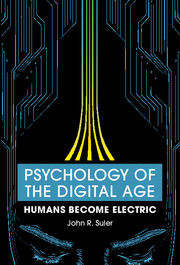Book contents
- Frontmatter
- Dedication
- Contents
- List of Figures
- Foreword
- Preface
- Acknowledgments
- Introduction: Newborns in Evolution
- 1 Cyberpsychology Architecture
- 2 Presence: Be Here Now
- 3 The Dynamic Digital Psyche
- 4 The Disinhibited Self
- 5 Electrified Relationships
- 6 Other Than You Think: Interpersonal Perceptions
- 7 Text Talk
- 8 Image Talk
- 9 I, Avatar
- 10 One of Us: Groups and Communities
- 11 Change and Excess
- 12 Addicted or Devoted
- 13 The Digital Deviant
- 14 Synthesized Realities and Synthesized Beings
- 15 Electric Th erapeutics
- Conclusion: Research and the Researcher
- References
- Index
Conclusion: Research and the Researcher
Published online by Cambridge University Press: 05 November 2015
- Frontmatter
- Dedication
- Contents
- List of Figures
- Foreword
- Preface
- Acknowledgments
- Introduction: Newborns in Evolution
- 1 Cyberpsychology Architecture
- 2 Presence: Be Here Now
- 3 The Dynamic Digital Psyche
- 4 The Disinhibited Self
- 5 Electrified Relationships
- 6 Other Than You Think: Interpersonal Perceptions
- 7 Text Talk
- 8 Image Talk
- 9 I, Avatar
- 10 One of Us: Groups and Communities
- 11 Change and Excess
- 12 Addicted or Devoted
- 13 The Digital Deviant
- 14 Synthesized Realities and Synthesized Beings
- 15 Electric Th erapeutics
- Conclusion: Research and the Researcher
- References
- Index
Summary
Most people say that it is the intellect which makes a great scientist.
They are wrong: it is character.
– Albert EinsteinA software company asked me to consult on a marketing project. They wanted to lock three volunteers in separate hotels rooms for several months, with nothing but food, a computer, Internet access, and, after they emerged from the ordeal, a hefty sum of money. Years later, a broadcast company asked me to consult on a new reality game show in which a group of people would be locked inside a house where they had to endure tests of pain over the course of a week. The viewing audience would cast votes online about the tests to be inflicted on the contestants, with the winner at the end of the week receiving a cash prize. Both companies wanted a cyberpsychologist, such as myself, to offer advice on how these projects could serve as a platform for scientific research. How would I assess a person's psychological reactions to long-term isolation inside a cyberspace bubble? Under the cloak of online anonymity, what would the audience be thinking and feeling as they inflicted pain on the game contestants?
I did not participate in either of these projects, but they compelled me to think about the nature of psychological research in this technological age of ours, where we find ourselves treading everyday inside this complicated digital universe that expands toward some unforeseen destiny. What issues should we investigate? What research methods should we use? What is best left alone? These questions belong not just to the researchers, but to everyone online, for we are all exploring this new territory together, and we are all being studied, often without knowing how or why.
CASE STUDIES OF DIGITAL LIFE FORMS
In this new millennium, we have entered the next stage in the expression of what it means to be human. The versatile universe of cyberspace has led to the evolution of previously unimagined forms of electric beings that are different from simple counterparts of corporeal humans. He is a “god” who walks among the avatars living in the world he created. She is the politically liberal comic, casting out daily 140-character messages to her thousands of devoted followers.
- Type
- Chapter
- Information
- Psychology of the Digital AgeHumans Become Electric, pp. 417 - 426Publisher: Cambridge University PressPrint publication year: 2015



